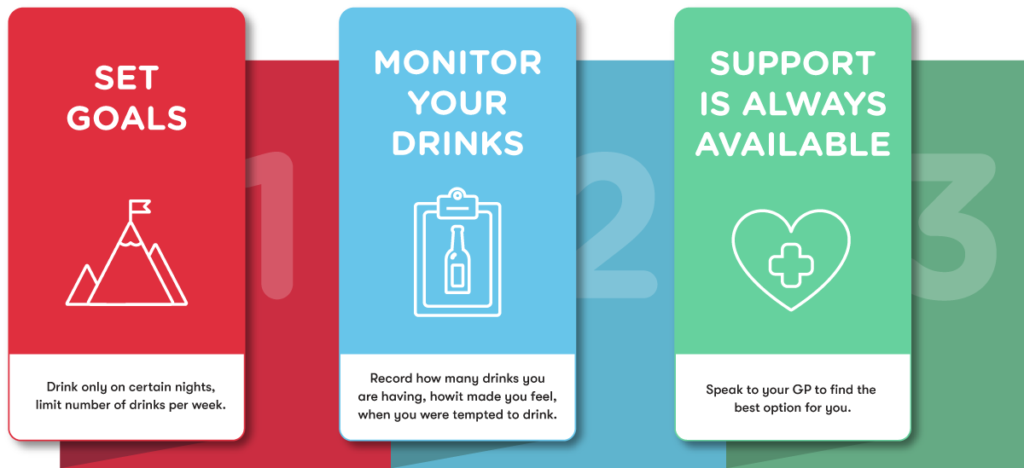You might be worried that the amount you drink every day and every week has crept up and up to risky levels. Here are some smart strategies for when cutting back feels like a real challenge.

1. Visit your GP
Drinking at risky levels can have a lasting impact on your physical health, mental health, personal relationships and finances. Most alcohol-related harm is caused by people whose drinking exceeds the recommended guidelines.
Speak to your GP who can recommend the best available support option for you. They will ask you about when you are drinking and how much, to help identify whether you are drinking at risky levels.
Based on an assessment of your situation they can provide information and advice on how to reduce your drinking safely and its potential harms. Included can be coping and motivational strategies as well as the development of a personal plan for you.
Depending on your situation, a GP can also refer you to more intensive treatment interventions run by specialist alcohol and drug services.
2. Group therapy
SMART Recovery Australia offers a free nationwide service of online or in person support meetings for people wanting to change behaviours of concern, including alcohol.
SMART Recovery meetings are run by trained facilitators who teach evidence-based tools and techniques, including Cognitive Behavioural Therapy (CBT) and Motivational Interviewing (MI) to help people achieve their goals and make positive life changes.
SMART Recovery Australia also offers support for people affected by the addictive behaviour of others, through its SMART Family & Friends program.
3. Individual options
Behavioural counselling involves a series of one-on-one sessions with a therapist or trained counsellor to help you address issues associated with risky drinking.
While it is usually conducted face-to-face, some counsellors are moving to phone or video link during COVID-19 restrictions. And there are also private and confidential online services available 24/7.
They can also discuss other treatment options and services that may be suitable for you.
Your GP can put you in touch with a counsellor or psychologist. Alternatively, you can try these services that don’t need referrals.
Important withdrawal advice
If you have been drinking at risky levels, stopping abruptly can cause significant withdrawal symptoms. These might include:
- Sweating
- Tremors
- Nausea
- Anxiety, irritability, difficulty sleeping
- Seizures or fits
- Delusions and hallucinations
Symptoms usually start around six to 24 hours after the last drink and can last from as little as two to three days and as long as 14 days.
For some people, stopping alcohol use abruptly can be dangerous.
If you drink at risky levels and you want to stop, consult a GP or other support service. They can develop a plan to gradually reduce your alcohol intake and minimise the risk of withdrawal symptoms.
Support Services
Discover the support options available to you.
START AN ALCOHOL DIARY
Download a copy of the diary.




